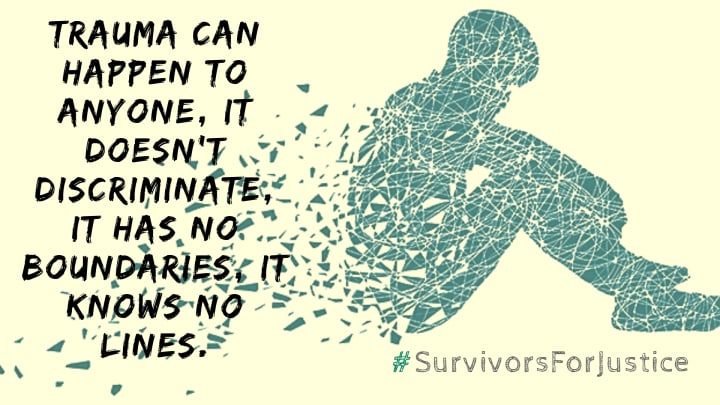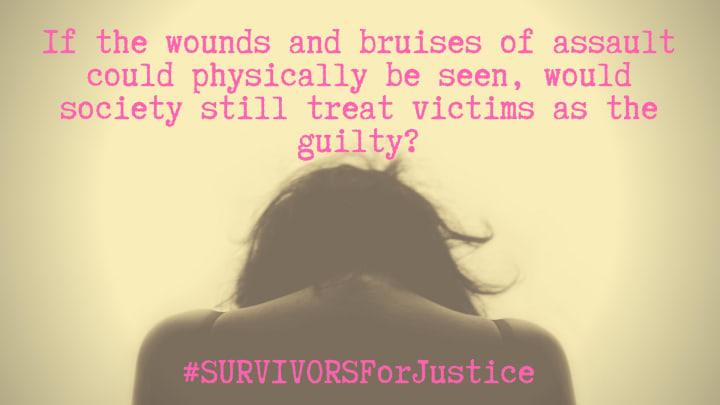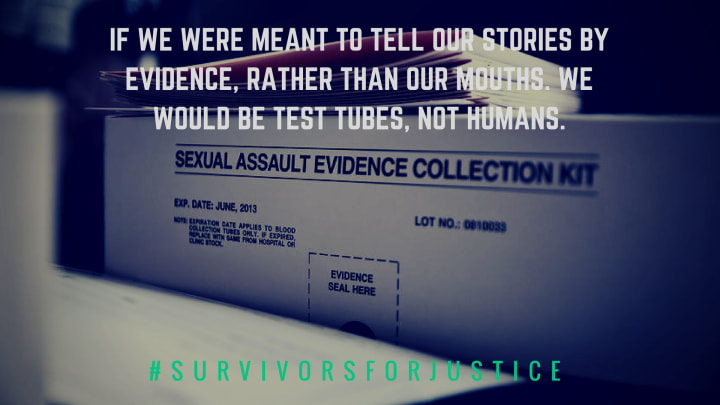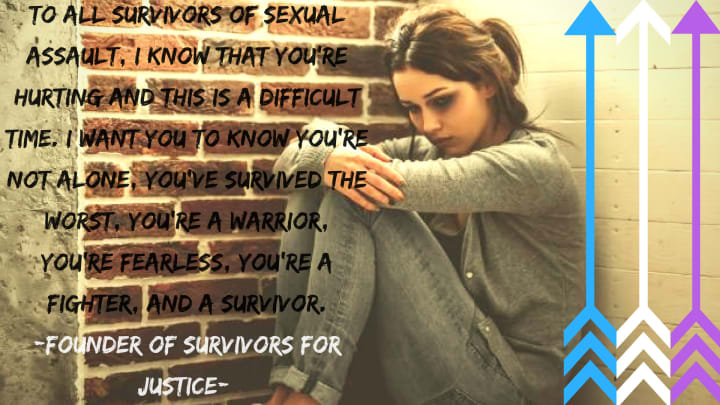The Definition of Courage
An Awareness of Trauma

The truth?
The truth is that trauma
Some call it karma
Others experience it
Reliving it as though it was a bridle and bit
See this is how flashbacks work
In the end you're the one stabbed in the back with a fork
You're the one who must write a statement
You're the one who must wait no matter the comment
No one tells you it will get easier
They just kind of brush it off and say get busier
If you get help to society you're the weak one
They look at you as if they're the nun
And you're just the unfortunate son
Trauma is just like cancer
See there's no cure
It doesn't discriminate so it doesn't need an answer
But those who see themselves as nuns aren't so sure
If we were really supposed to be unfortunate sons
Why are our sentences full
If the nuns are so pure
Why are their lines blank
Yet I bet they never thought about
What if I was the one bloodied and bruised
What if I was the one in the exam room
With flashbacks and nightmares that love to shout out
In the night waking up every time to journal and assume
Would this be enough to drown out
Could we think for just a second
As the human beings we are
Rather than the empirical thinking in our minds defected
What if the trauma instead of inside; on the outside left scars
Do you know why so many of us stay silent; our stories undetected
Because we're afraid of retaliation
The kind that sends the innocent behind bars
Yes we have voices
Perpetrators should also understand
They too have choices
One is avoidance
While the other proceeds
They act as if what happened
Was just a dance
A dance that caused a broken leg
One in which later could be laughed off
But this,
This isn't a laughing matter
Just as the thief in the night lets out a hiss
As he takes the strangers belongings
The bloodstained bed sheets
Only happened from one of many
An unwanted kiss
The good news is
There is healing from the pain
There is forgiveness in the heart
Redemption finds itself within the stain
What you thought tore you apart
Just might be the bravest water main
Causes of Trauma and What It Is

Trauma is a consistency of triggers, flashbacks, nightmares, hypervigilance, reliving the event, insomnia, and numbing out. The events in which cause trauma have a wide variety; meaning what could be traumatic for one individual may not necessarily be traumatic to someone else. The most common trauma indicators are sexual assault, domestic violence, car accidents, being arrested, human trafficking, natural disasters, man-made disasters, crises, or even being over sexualized as a child. The three main self-harm coping strategies used to deal with trauma are: cutting, binge eating/eating disorders, and the substance abuse of drugs/alcohol, or inhalants.
The Most Common Reasons We Don't Report

Not only are survivors afraid of retaliation through being arrested by law enforcement; however, if you've been up-to-date between the Kavanaugh, Cosby, and Spacey cases; then you know what I'm referencing. For those of you unaware or at least uneducated; survivors haven't only experienced the stigma of victim blaming, they've experienced threats and have needed witness protection. Such as Christine Blasey Ford has had to leave her own home because of death threats and similar threats to set her house on fire. While Cosby's survivors were asked why they didn't come forward earlier, in the same instance that Ford was discredited by Donald Trump saying something along the lines of, "...if it was true she would have reported it when it happened."
Things Are Changing...

I had the incredible opportunity to read about the University of Ohio's rally towards the 12 sexual assaults that happened on their campus. It's amazing to see law enforcement finally stepping up to do the right thing. In the same instance it reminded me so much of the 2009 documentary over the Duluth, Minnesota domestic violence cases rising. When these cases raised concern in both states; law enforcement saw the need to take initiative to prevent these dangerous crimes or at least lessen them.
Within this same instance, there are men who are experiencing domestic violence and are unable to reach out to resources. This is either because there are limited resources or states are still taking the Duluth law/power and control wheel to heart. In the same equations some places unlike Ohio and Duluth are not as fortunate enough to receive help from law enforcement, such that there have been agencies that have made reports disappear or have gone to the next extreme and arrest survivors of sexual assault. I know of three cases thus far in which this has happened to and all three of them have been dismissed. I've had the pleasure of speaking with one of the advocates over the phone within the general area. She (the advocate), has brought to light that there's a new police chief who's not only actively involved in the nonprofit organization's events. However, also has made mention he wants to change the way things are being handled there.
I was actually told by one of my professors in my human behavior and social environment 1 class that, "it's necessary to take risks in reporting to law enforcement about trauma." She was meaning it's, "...crucial enough now to do so if a law enforcement official threatens the wellbeing of the victim/survivor. Because if survivors back down in silence, then change isn't going to happen." And, sometimes this sends victims/survivors to be incarcerated; however, this is an epidemic in which needs to be speedily addressed. As victims/survivors should feel heard and safe enough to report; this is a situation that states if not me then who type of thought process.
Do You Really Think Their Belief System Would Change?

This is a question I've been faced with multiple times and this question as hard as it is to be truthful, it would be unethical to lie. If I had to be honest, I don't think it would make any difference if the wounds and bruises were physical or not. I feel it all comes down to who serves the victim/survivor, and whether their intentions are coherent with the law; not against it. This would have to first change the view of society's mind towards victim blaming and cultural shock. Secondly, the change would have to impact both local law enforcement, mental health, and schools (both high schools and universities). Thirdly, it would have to change the way not only parents are educated but their children being educated within the community as well.
Why It's Important How You Treat Survivors

The reason it's important to treat survivors with belief/certainty is because if a stigma is brought into play and/or victim blaming arises; survivors will be less prone to reach out the next time. Be aware of how to speak the language of survivors and how to create an atmosphere where they feel comfortable/safe within any space in which they're sharing their story. Make sure to always keep their stories in confidence; they will be more likely to reach out again if another incident occurs, which unfortunately is more often than not.
(Note: A person is considered to be a survivor after any and all trauma; not just sexual assault, or domestic violence).
Healing Is in Sight

The best ways to start the healing process is to get involved with a support group, practice yoga, find a therapist that specializes in trauma (this is a big one), practice grounding, practice being mindful, talk to someone (such as a domestic violence advocate), journal, find a hobby, get involved in a sports event, create a safety plan, exercise, find other means of healthy coping, and ultimately allow yourself time to heal through self-care and self-love. (Note: there's no rush to healing, take as long as you need)!
There are three stages of trauma healing; victim, survivor, and thriver. Victim status is when you're still in the process of accepting, processing, and even reporting a significant trauma (whether it be with law enforcement, a therapist, or an advocate). Being in the survivor stage is when the survivor of trauma has reached a level of acceptance and is able to admit that it happened without allowing it to define him/her. Thriver status is when a survivor has gone from acceptance through saying, "Yes, I've been sexually assaulted; however, it doesn't define me." The difference between survivor status and thriver is the survivor is able to accept the above phrase without going into detail. To be a thriver one has to understand that just because a trigger is associated with an event, the object (whether animate or inanimate); doesn't have to define that trauma and it certainly doesn't have to define them in a way in which consumes their being.
Remember This Simple Phrase:

You've survived the worse, there is nothing greater than that capability. Yes it hurt, yes it was painful, yes at times it was uncomfortable; nonetheless, I've owned my vulnerability and these triggers/flashbacks can come at me because it can't hurt me. I get to choose how I live the day; meaning it's neither good nor bad, it's what I place my focus on; and the good news is so can you! To all of you reading this going through the very same struggle; you're not alone, I've also been there, done that, and am willing to help. Here are the final words I have for you all through one of my campaign graphics:
Founder's Note to All You Trauma Fighters out There:

I decided to add one more graphic below because I touched on vulnerabilities; however, neglected to mention they're meant to be felt, not acted upon. No matter how engrained your homeostasis cycle may be, there are better things than placing your safety on the line. Therefore, healing comes through the feeling of vulnerability rather than the acting thereof. Through the feeling of this vulnerability rather than allowing actions of impulses to happen is momentarily where you'll find your innermost strength. So, just like Journey said, "Don't stop believing!" Keep fighting strong, you've got this; remember, we're all in the same battle, just different wars.
Famous Words Of A Psychology Legend

About the Creator
Mary McMichael
Hello, I'm Mary McMichael and I'm the founder of Survivors For Justice. I am in the process of writing my own book, getting my bachelor's in digital media, have a mind for creativity, and a big heart for people.





Comments
There are no comments for this story
Be the first to respond and start the conversation.